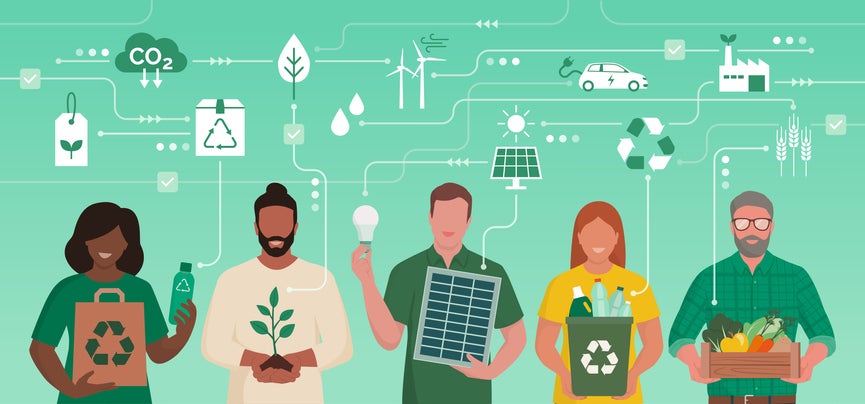
The growing emphasis on sustainability in nearly all sectors has placed the packaging industry under scrutiny. As a critical component of the global economy, the packaging sector holds significant environmental implications that must be managed through regulations and policies.
In the pursuit of sustainable packaging, a holistic approach is necessary, encompassing aspects such as material selection, carbon footprint reduction and the development and implementation of government regulations that foster a circular economy.
What are the three main elements of sustainable packaging?
Resource planning aims to cut waste by encouraging reusability through material choices, which facilitate reuse and efficient recycling.
Carbon reduction strives to lower the impact of greenhouse gas emissions by considering the entire carbon lifecycle of packaging, from manufacturing to consumer behaviour. Grasping an understanding of the stages in the lifecycle with the largest carbon emissions enables those areas to be addressed through the initiation of programmes such as utilising renewable energy for production or enhancing transportability through alterations in packaging dimensions or form.
Waste reduction aims to lower waste volume through strategies such as waste prevention, reuse, recycling and composting. This can be achieved through material minimisation, recyclable or compostable designs and reusable packaging systems. Using alternative packaging materials, such as recycled paper, biodegradable polymers and plant-based options, can also decrease the carbon footprint of packaging.
How can regulations and policies help with sustainable packaging?
Established regulations and policies inform decision-making among businesses in terms of their packaging. Making the environmental impact of a diverse array of materials and products transparent can encourage manufacturers to choose more sustainable options.

US Tariffs are shifting - will you react or anticipate?
Don’t let policy changes catch you off guard. Stay proactive with real-time data and expert analysis.
By GlobalDataFor instance, environmental Product Declarations (EPDs) can provide valuable data for comparisons. Nevertheless, the current EPD system contains technical documentation that is difficult to evaluate, whilst there is a shortage of available EPDs. To tackle this problem, it is critical to make these evaluations more accessible to the general public.
There is also a need for more sophisticated guidance in evaluating the emissions associated with different disposal techniques. Presently, the emission factors provided by the UK Department for Business, Energy & Industrial Strategy inadvertently provide incentives for organisations to prefer landfill disposal of plastic rather than recycling.
To address this issue, an effective strategy should focus on pinpointing opportunities to decrease carbon emissions, specifically from recycling processes themselves. This may encompass investments in cutting-edge recycling technologies, enhancement of sorting and separation procedures and the investigation of pioneering recycling methodologies for a diverse array of materials.
Besides transparency on the environmental impact of materials, incentives and regulatory measures play a vital role in promoting sustainability. The UK, for example, has taken a leading role in implementing environmental policies such as the ban on plastic microbeads and limitations on single-use plastic items.
These policies are important in addressing both the impact on resource use and environmental plastic pollution. The implementation of policies encourages consumers and businesses to adopt sustainable alternatives.
Despite efforts to manage plastic waste recycling, a notable gap persists in the UK between recycling rates of paper/cardboard (71%) and plastic packaging (44.1%).
To address this, the UK government introduced a tax in 2022 targeting plastic packaging with less than 30% recycled content. This strategic tax measure is designed to provide businesses with an economic incentive to incorporate recycled plastic materials into their packaging. This fosters increased waste plastic recycling and collection rates and ultimately reduces waste destined for landfill or incineration. The tax is projected to increase recycled plastic utilisation by 40% and result in carbon savings of nearly 200,000 tonnes during 2022-2023.
Furthermore, in light of the pressing demand for enhancing the recyclability of packaging materials, the UK government has introduced the concept of ‘Extended Producer Responsibility’ (EPR).
As of January 2023, businesses have been mandated to collate data pertaining to their packaging to comply with EPR regulations, with a registration deadline of 2024, at which point fees shall become payable to the environmental regulator.
By holding packaging manufacturers responsible for non-recyclable materials, EPR is anticipated to lead to a shift towards reusable or recyclable materials, thus fostering a circular economy.
It is imperative to create informed and balanced policies in order to circumvent potential pitfalls while meeting sustainability objectives and goals. Certain measures may inadvertently encourage bad behaviours, such as an increase in landfill disposal to reduce the measured carbon footprint of companies that conduct yearly carbon assessments.
Policymakers must carefully evaluate the potential consequences of their actions to ensure that they do not result in counterproductive outcomes.
Another challenge is the potential for ‘greenwashing’ or the practice of making misleading claims about the environmental benefits of a product or service. Policymakers and industries must remain vigilant against greenwashing and promote transparency.
About the authors: Nathan Wood, Dr Aaron Yeardley, Natalie Bavis and Dr Torill Bigg are all carbon reduction scientists at Tunley Engineering.



